Overview
Hospital IT plays a crucial role in modern healthcare, encompassing technologies that manage medical data, enhance communication, and improve patient care through systems like electronic health records (EHR) and telemedicine.
How can we ensure that our healthcare systems are both efficient and effective? These technologies streamline operations, reduce errors, and significantly enhance compliance with regulations.
For instance, the implementation of EHR has led to a remarkable 30% reduction in medication mistakes. This not only improves healthcare delivery but also elevates patient outcomes.
The integration of such platforms is not just beneficial; it is essential for a future where patient care is prioritized.
Introduction
In the rapidly evolving landscape of healthcare, the role of hospital IT has become increasingly pivotal in enhancing patient care and operational efficiency. As medical facilities strive to integrate advanced technologies such as Electronic Health Records (EHR), telemedicine, and artificial intelligence, they confront the dual challenge of modernizing legacy systems and navigating complex regulatory environments. This integration streamlines processes and significantly impacts patient outcomes, reducing errors and improving access to care.
Furthermore, experts emphasize the importance of robust data management and compliance, suggesting that the future of hospital IT is poised to transform healthcare delivery, making it more efficient, secure, and patient-centered. This article delves into the core functions of hospital IT, the key technologies driving change, and the future trends that will shape the healthcare landscape.
Defining Hospital IT: An Overview of Its Core Functions
Hospital IT encompasses the technologies and systems that manage medical data and enhance communication within medical facilities. Its core functions include electronic health records (EHR), client management systems, and clinical decision support systems. EHRs are particularly vital; projections indicate that by 2025, over 90% of medical facilities will have adopted these systems, underscoring their importance in modern healthcare.
The World Health Organization’s resolution WHA72.6 underscores safety as a key strategic priority, further emphasizing the vital role of EHRs and healthcare IT systems in improving care. These technologies optimize operations, improve care, and ensure adherence to regulatory standards. For instance, a recent case study on successful EHR implementation in a major medical facility demonstrated a 30% reduction in medication mistakes, showcasing the direct impact of effective healthcare IT on safety and care quality.
Moreover, expert opinions emphasize that the integration of various IT solutions not only improves data accessibility but also reduces operational errors, ultimately enhancing overall health outcomes. Avato’s Hybrid Integration Platform plays a crucial role in this landscape by accelerating the integration of isolated legacy systems. It delivers a connected foundation that simplifies complex integrations and reduces costs. Additionally, Avato provides real-time monitoring and alerts on system performance, ensuring that healthcare facilities can maintain optimal operations.
As highlighted by Gustavo Estrada, Avato simplifies complex projects and delivers results within desired time frames and budget constraints, reinforcing the strategic imperative of committing to electronic health records. In addition, advancements in hospital IT functions, such as the adoption of AI-driven analytics and virtual reality (VR) technologies, are streamlining tasks and alleviating physician stress, while also humanizing patient care. These innovations enhance information accessibility and provide new avenues for treatment, as seen in the application of AI and VR in addressing conditions like PTSD. However, ethical considerations regarding information privacy remain paramount.
The convergence of information innovation and privacy in medical services offers both potential and obstacles, requiring a dedication to safeguarding sensitive health details while advancing hospital IT technologies. For example, the case study on Privacy-Preserving Data Sharing Through Federated Learning illustrates how innovative solutions can address privacy concerns while enhancing data sharing in medical settings, aligning with the discussion on data innovation and privacy.
Overall, the integration of robust hospital IT systems, supported by Avato’s secure hybrid integration capabilities, is essential for modern medical services. It enables facilities to meet the evolving demands of care while ensuring compliance and enhancing operational efficiency.
Key Technologies in Hospital IT: Tools and Systems That Drive Healthcare
Key technologies in healthcare IT encompass Electronic Health Records (EHR), Health Information Systems (HIS), and telemedicine platforms, each playing a vital role in modern healthcare delivery. EHR systems facilitate the digital storage and retrieval of patient information, significantly improving care coordination and clinical decision-making. Kevin Schulman from the Clinical Excellence Research Center at Stanford University School of Medicine remarked, “The remarkable increase in EHR technology adoption among US medical facilities over the past decade, as evidenced in our study, is a testament to the transformative impact of ARRA’s enactment in 2009.”
With the German government investing over €1.2 billion in digital health initiatives, the adoption of EHR systems has surged, reflecting a broader trend toward digitization in healthcare. This shift is not merely a trend; it’s a fundamental transformation that enhances the quality of care.
HIS combines various healthcare functions, such as billing, scheduling, and client management, into a cohesive system that boosts operational efficiency. Notably, the concentration of EHR vendors is significant, with six major companies dominating 90% of the market. This concentration affects adoption rates and the ability of hospitals to address individual needs and regulatory requirements, emphasizing the importance of careful vendor selection, as highlighted in the study on the market concentration of EHR vendors.
Telemedicine platforms have emerged as crucial tools for expanding access to care, particularly in the wake of the COVID-19 pandemic. These platforms facilitate remote consultations, enabling medical professionals to connect with individuals who might otherwise encounter obstacles to in-person visits. The impact of telemedicine on healthcare delivery is profound, as it not only improves access for individuals but also enhances engagement and satisfaction. Are you ready to embrace this shift in care delivery?
Emerging technologies such as artificial intelligence (AI) and machine learning (ML) are increasingly being integrated into hospital IT. These innovations enhance diagnostic accuracy and operational efficiency, paving the way for more personalized and effective patient care. Avato’s Hybrid Integration Platform, dedicated to simplifying complex integration challenges, plays a critical role in this transformation by unlocking isolated assets and enhancing business value.
Key features of the platform include:
- Seamless data integration
- Real-time analytics
- Robust security measures
These features ensure that medical providers can leverage these technologies effectively. As medical services continue to progress, the transition toward patient-focused, interoperable frameworks is crucial to reduce maintenance expenses and enhance digital interaction, ensuring that facilities can adjust to the evolving environment of medical delivery. The time to act is now—embrace these technologies for a more efficient and effective healthcare future.
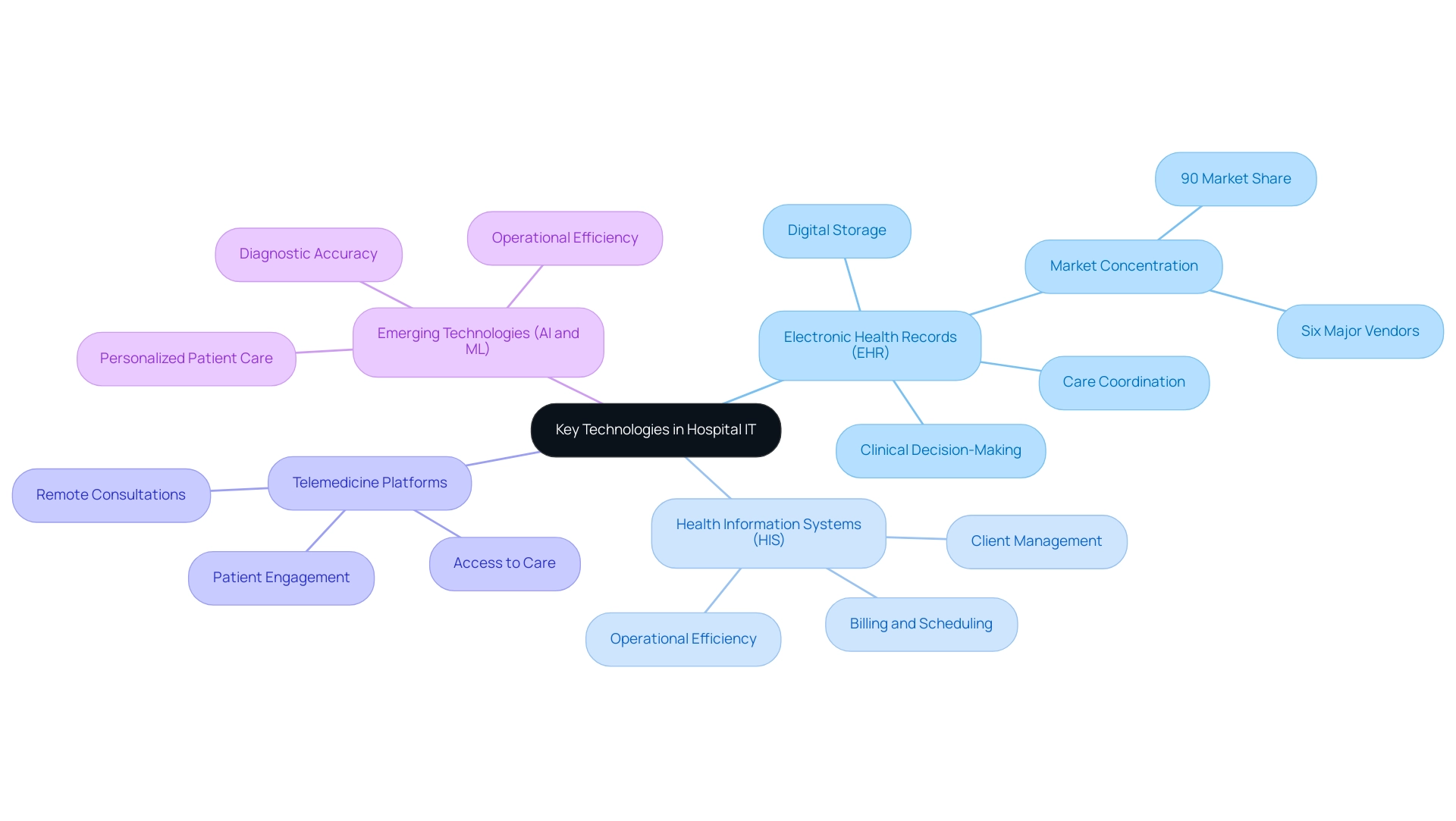
Data Management in Hospital IT: Ensuring Security and Integrity
Data management in hospital IT involves the systematic collection, storage, and analysis of health information, with a paramount focus on ensuring security and integrity. In 2025, the medical sector faces substantial challenges, as information theft remains the most common breach type, constituting 65.85% of all breaches. This alarming statistic underscores the urgent need for healthcare facilities to establish robust governance policies that protect sensitive patient information from unauthorized access and breaches.
Dr. L. Ponemon, founder of the Ponemon Institute, asserts that ‘the protection of information, privacy, and security is paramount in today’s healthcare environment.’ To safeguard information, hospitals must adopt a multifaceted approach that includes encryption, stringent access controls, and regular audits within hospital IT. These measures are essential not only for compliance with regulations like HIPAA, which enforce breach policies to mitigate harmful consequences, but also for maintaining trust among individuals receiving care.
The repercussions of information breaches can be severe, leading to a loss of trust among patients and potentially jeopardizing their care.
As healthcare increasingly embraces digital medicine, the roles of AI and VR become critical in humanizing care. These technologies not only enhance treatment options but also require secure and accessible information management systems to function effectively. Effective information management practices are vital for ensuring integrity, which is crucial for accurate patient care.
Errors in information can result in misdiagnosis and treatment delays, emphasizing the necessity of meticulous information management. Successful healthcare organizations, such as Avato, have implemented comprehensive information governance frameworks that prioritize security and compliance, thereby enhancing their operational capabilities.
Expert opinions highlight that a proactive approach to information management is essential for hospital IT management. Implementing best practices, such as continuous monitoring of access and usage, can significantly reduce risks associated with breaches. Furthermore, case studies in the medical field reveal that organizations with robust information security measures not only protect sensitive details but also foster a culture of trust and responsibility.
In summary, as the medical landscape evolves with the integration of digital medicine, the importance of efficient information management in hospital IT cannot be overstated. By prioritizing information security and compliance, hospitals can ensure they are well-equipped to navigate the complexities of modern healthcare while safeguarding individual details. Additionally, empowering patients with control over their health information is crucial for unlocking the full potential of these advancements.
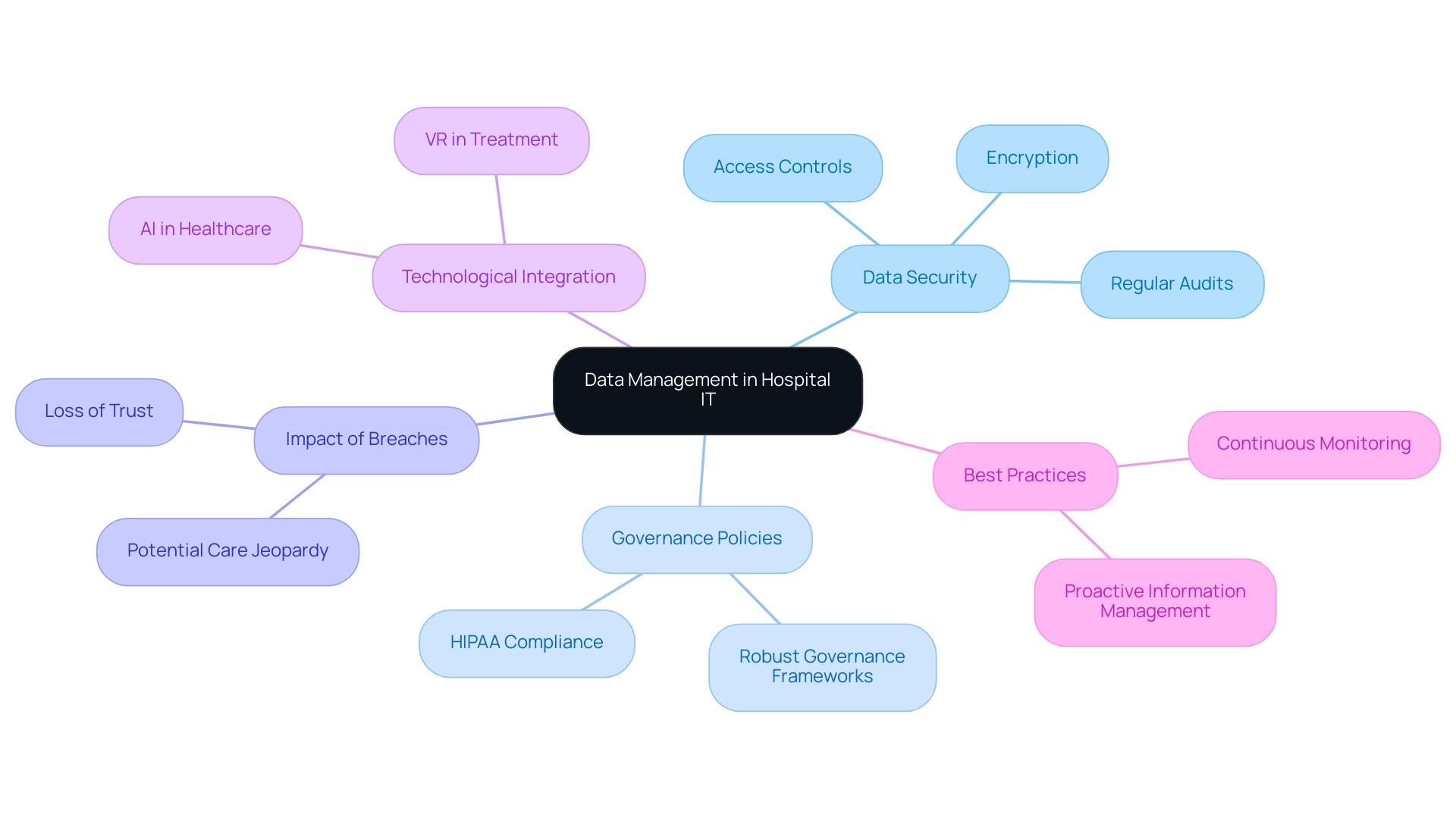
Overcoming Integration Challenges: Bridging Legacy Systems with Modern Solutions
Hospitals frequently encounter significant challenges when attempting to integrate legacy systems with modern hospital IT, resulting in information silos and operational inefficiencies. These outdated systems often lack the necessary interoperability, complicating information sharing across various platforms. To effectively address these challenges, the adoption of Avato’s hybrid integration platform emerges as a crucial strategy.
This platform facilitates seamless communication between legacy and modern systems, enhancing data flow while minimizing disruptions during the transition process.
Investing in Avato’s hybrid integration solutions not only streamlines operations but also addresses the critical need for comprehensive access to information. For example, transitioning from paper to electronic health records has demonstrated a 3% reduction in outpatient care costs, equating to savings of approximately $5.14 per patient each month. This statistic underscores the financial advantages of modernizing IT infrastructure in the medical field with Avato’s dedicated approach.
Furthermore, expert insights emphasize that cultivating a digital culture is essential for the long-term success of transformation initiatives. As Matt Banholzer, a partner at McKinsey, asserts, “Building a digital culture helps the transformation succeed over time.” As medical systems increasingly recognize the value of digital and analytics capabilities, they position themselves to capitalize on a substantial market opportunity estimated between $200 billion and $360 billion.
Recent case studies indicate a growing preference for structured data integration methods, particularly the utilization of semantic models in medical data projects. This trend reflects a shift towards predefined message templates over traditional middleware solutions, further illustrating the effectiveness of Avato’s hybrid integration platform in overcoming legacy system challenges.
In summary, Avato’s hybrid integration platform not only facilitates the bridging of legacy and modern IT systems but also enhances efficiency, improves cybersecurity, and reduces maintenance costs through strategic outsourcing. Additionally, the platform offers real-time monitoring and alerts on system performance, ensuring that providers can respond promptly to any issues. As hospitals continue to navigate the complexities of IT modernization, Avato’s solutions will play a pivotal role in enabling medical providers to deliver timely and comprehensive care.
Navigating Compliance: The Regulatory Landscape of Hospital IT
Navigating the regulatory landscape of hospital IT presents a multifaceted challenge, necessitating a deep understanding of various laws and standards, particularly HIPAA and HITECH, alongside state-specific regulations. Compliance with these regulations is not merely a legal obligation; it is essential for safeguarding patient privacy and ensuring the security of sensitive health information. Hospitals must create strong compliance programs that include:
- Regular staff training
- Comprehensive audits of IT systems
- Development of clear data handling policies
The financial stakes are high. The average cost of a data breach in the medical field has reached approximately $7.13 million, highlighting the critical need for effective compliance measures. Non-compliance can lead to substantial fines and irreparable damage to a hospital’s reputation. Therefore, it is imperative for IT managers to remain vigilant and informed about ongoing regulatory changes.
Successful compliance programs in medical IT not only mitigate risks but also enhance operational efficiency. For instance, medical institutions that have implemented comprehensive compliance strategies have reported improved security postures and reduced vulnerabilities. A notable case study involves UpGuard, which has assisted healthcare organizations in meeting HIPAA compliance through its attack surface management and third-party monitoring solutions.
By leveraging these tools, healthcare facilities have strengthened their cybersecurity measures, significantly lowering the risk of data breaches. Specific outcomes from these implementations have shown a marked decrease in vulnerabilities, demonstrating the effectiveness of proactive compliance strategies.
Expert opinions highlight the necessity of navigating the complexities of HIPAA regulations effectively. As Steve Alder, editor-in-chief of The HIPAA Journal, emphasizes, adhering to the minimum necessary standard is crucial for ensuring that only essential information is disclosed.
Furthermore, the most common HIPAA violations identified in enforcement actions include:
- Failures in risk analysis
- Inadequate reviews of information system activity
- Violations of HIPAA Right of Access
These challenges can lead to severe penalties, reinforcing the need for robust compliance programs. In summary, the importance of compliance programs in hospital IT cannot be overstated. They are essential for fulfilling regulatory requirements and for promoting a culture of security and accountability within organizations.
As the regulatory environment continues to evolve, IT managers must prioritize compliance to safeguard their institutions and the individuals they serve. Additionally, understanding the different HIPAA compliance obligations for covered entities and business associates is essential for a comprehensive approach to regulatory adherence.
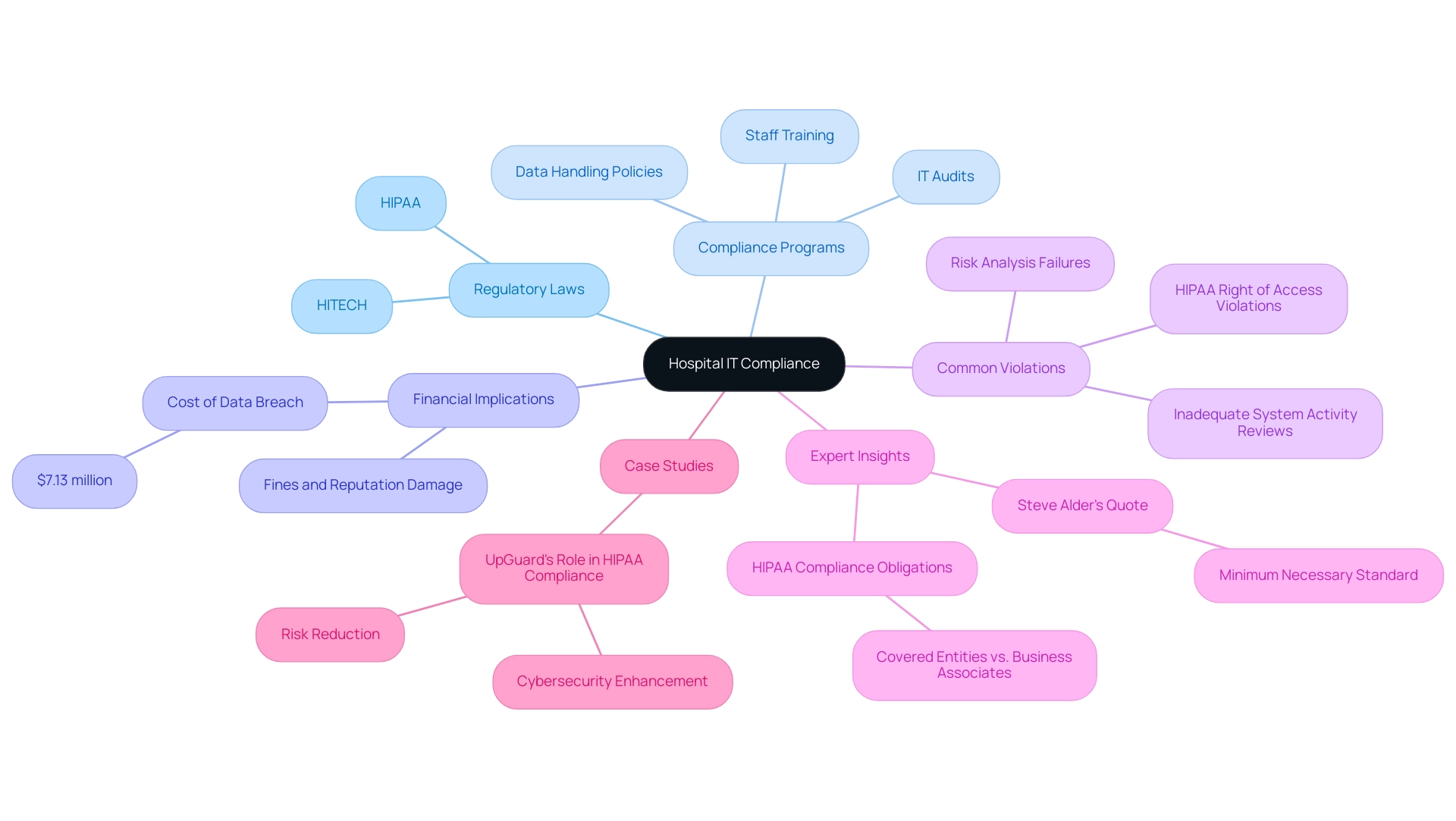
Enhancing Patient Care: The Impact of Hospital IT on Healthcare Delivery
Hospital IT plays a crucial role in enhancing care by significantly improving the precision and efficiency of medical delivery. Electronic Health Record (EHR) systems, for example, provide real-time access to individual data, empowering medical providers to make informed decisions swiftly. This capability is vital; studies indicate that hospitals utilizing EHRs have experienced a 20% reduction in readmission rates, underscoring the direct impact of technology on patient outcomes.
Furthermore, one third of the 23 studies evaluated their processes within three months of implementing computerized systems, further highlighting the effectiveness of EHR systems in advancing healthcare delivery.
The integration of telemedicine solutions has revolutionized access to care, especially for individuals in remote areas who might otherwise encounter barriers to timely treatment. Additionally, the incorporation of clinical decision support systems within medical IT frameworks assists clinicians in adhering to best practices, thereby reducing errors and enhancing care quality. As noted by Jeremiah Olawumi Arowoogun, “This paper explores the ethical considerations in medical Information Technology (IT), focusing on data privacy and individual consent concerns,” emphasizing the critical importance of these factors in the implementation of facility IT.
Moreover, advancements in artificial intelligence (AI) and virtual reality (VR) within hospital IT have transformed outcomes for patients. AI-driven predictive analytics can identify at-risk individuals, enabling providers to implement timely interventions that significantly improve recovery rates. For instance, the application of VR in pain management has yielded remarkable results, allowing patients to experience diminished pain perception during procedures.
A case study involving a rural family practice that adopted an EHR and Practice Management system illustrates this point; the practice reported a 10% increase in case mix and over $100,000 in increased revenue due to improved documentation and coding practices, showcasing the tangible benefits of EHR adoption.
As the medical landscape evolves, the role of hospital IT in enhancing service delivery efficiency and individual care remains paramount. The continuous advancements in technology not only streamline operations but also ensure that providers can deliver high-quality care tailored to their patients’ needs. With Avato serving over 850,000 medical professionals and reporting annual revenue of $1.3 billion, the scale and impact of EHR technology in the medical sector is evident, reinforcing the significance of hospital IT in clinics.
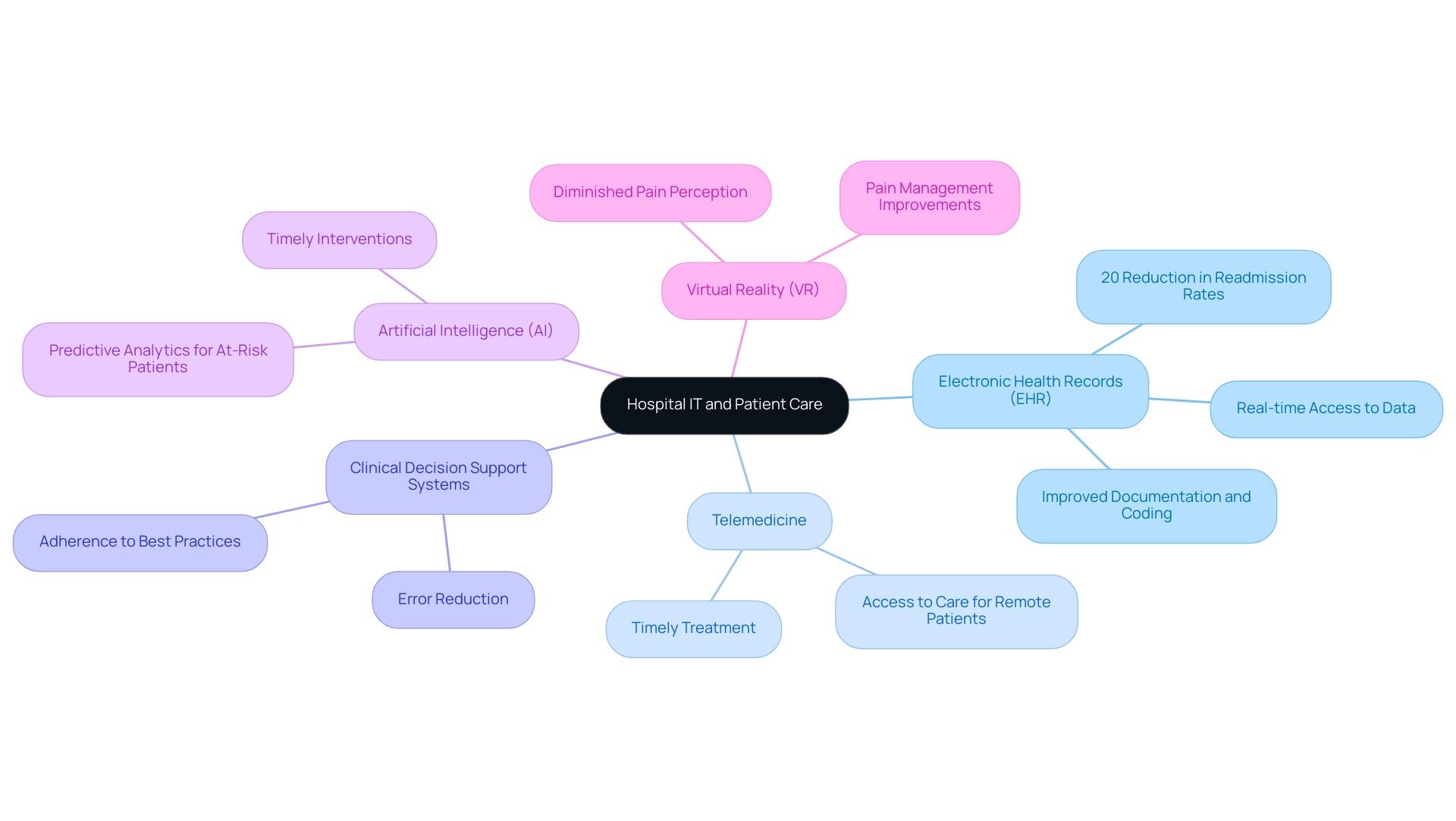
Future Trends in Hospital IT: Innovations Shaping the Future of Healthcare
The future of hospital IT is on the brink of a remarkable transformation, driven primarily by technological advancements and the strategic implementation of Avato’s hybrid integration platform. This platform simplifies the integration of disparate systems, enabling organizations to unlock isolated assets and enhance business value creation. A significant trend is the growing adoption of artificial intelligence (AI) and machine learning, which are increasingly utilized for predictive analytics.
These technologies not only optimize therapy selection but also enhance operational efficiency by predicting patient demand in emergency departments. In fact, 80% of health system executives identify AI as the most exciting emerging technology for the medical field, underscoring its potential impact.
Furthermore, telehealth solutions are experiencing rapid growth, propelled by the need for accessible medical services. This shift has been accelerated by the pandemic, leading to a surge in virtual consultations and remote client monitoring. As medical organizations continue to invest in telehealth, they are likely to see enhanced client engagement and satisfaction.
Moreover, the integration of Internet of Things (IoT) devices is revolutionizing real-time monitoring of individuals. These devices enable ongoing wellness monitoring, allowing medical professionals to react swiftly to individual requirements. The role of IoT in medical advancements is crucial, as it improves information gathering and evaluation, ultimately resulting in enhanced outcomes for individuals.
As hospitals embrace these innovations, the emphasis on interoperability will intensify. Organizations will strive to create seamless data exchanges across various platforms, ensuring that medical professionals have access to comprehensive individual information. This focus on integration, supported by Avato’s dedicated hybrid integration platform, will not only streamline operations but also enhance the overall quality of care delivered to patients.
Gustavo Estrada, a customer, noted, “Avato has simplified complex projects and delivered results within desired time frames and budget constraints,” highlighting the importance of effective integration solutions in navigating these technological advancements.
Looking ahead to 2025, the landscape of medical IT will be characterized by these advancements, positioning organizations to meet evolving demands and enhance service delivery. The successful adoption of AI and machine learning, along with the strategic implementation of IoT, will be crucial in shaping the future of hospital IT. Additionally, parallels can be drawn from major retail chains implementing AI-driven recommendation systems, which enhance customer satisfaction and could inform similar strategies in the medical field.
The case study on predictive analytics in retail illustrates how AI algorithms can optimize processes, a concept that is equally relevant in the healthcare context.
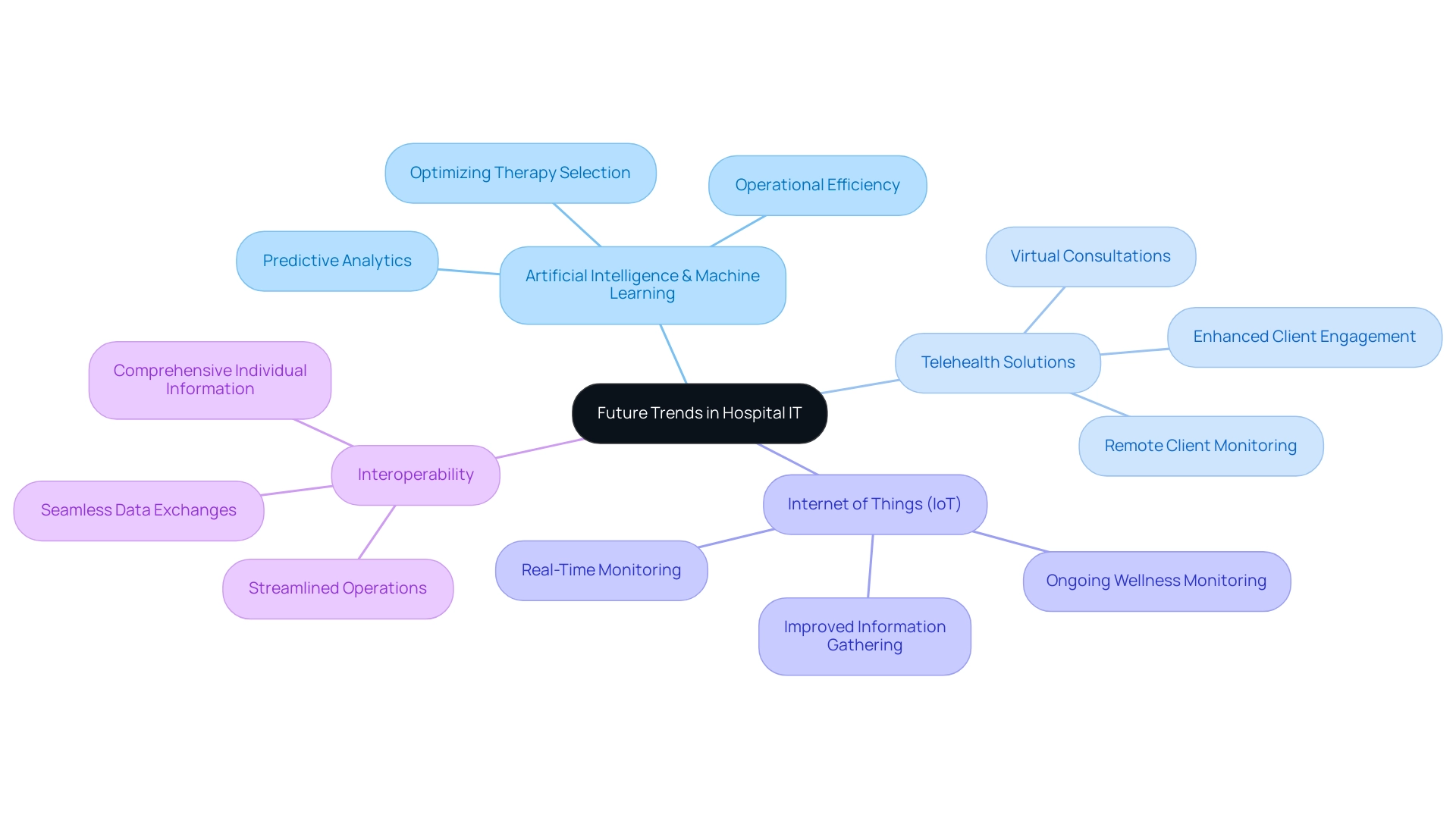
Conclusion
The integration of hospital IT is fundamentally transforming healthcare, enhancing both patient care and operational efficiency. Key technologies—such as Electronic Health Records (EHRs), patient management systems, and telemedicine—are vital in improving data accessibility and clinical decision-making. This transformation leads to significant reductions in medication errors and lower readmission rates.
As we look toward the future, advancements in artificial intelligence and the Internet of Things promise to further revolutionize hospital IT. These innovations will not only optimize patient care but also enable real-time monitoring. Additionally, telehealth solutions will expand access to underserved populations. However, the focus on data management and security remains paramount. Implementing robust compliance programs is essential for protecting sensitive patient information and maintaining trust.
Platforms like Avato’s hybrid integration solutions play a crucial role in overcoming integration challenges and ensuring seamless interoperability among systems. By prioritizing these advancements, healthcare organizations can effectively meet the demands of modern healthcare delivery, ultimately enhancing patient experiences.
In summary, the evolution of hospital IT is about creating a more efficient, secure, and patient-centered healthcare system. A commitment to advanced technologies and effective data management practices will shape the future of healthcare, making continuous adaptation and innovation imperative for organizations. Are you ready to embrace this transformation and lead the way in delivering exceptional patient care?

